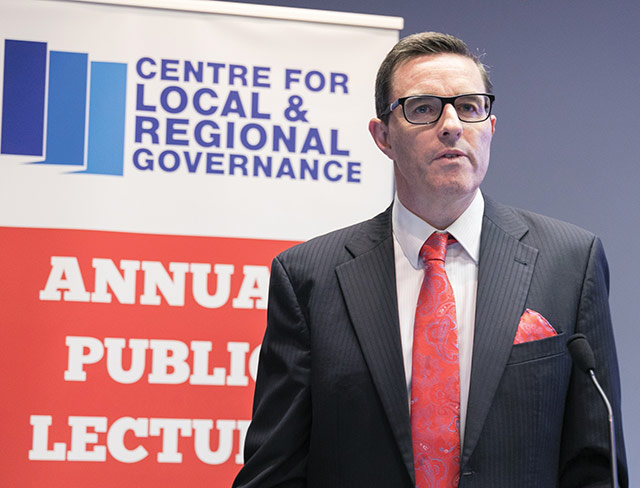Brexit: A barrier to cross-jurisdictional cooperation?

Cooperation can be alternative to structural changes but will cross-border arrangements be complicated by Brexit, asks Dr Aodh Quinlivan, Centre for Local and Regional Governance, University College Cork.
On 7 March, I had the pleasure of presenting evidence to the All-Party Parliament Group for District Councils at the House of Commons. The final report from this parliamentary group will be published in London on 24 May. The main topic under discussion in March was cooperation/collaboration between local councils. In presenting my thoughts to the committee, I commented on the possible impacts of Brexit. In this article for agendaNI, I will again try to cover both topics, i.e. inter-council co-operation and the implications of Brexit.
The economic crisis from 2008 had a profound effect on local government in the Republic of Ireland. Unsurprisingly, the focus was placed very much on concepts like rationalisation, cost-cutting, value for money, economies of scale and less so on issues relating to local democracy, citizenship and participation. Staffing levels in local government were reduced by 24 per cent in five years and in that same period cost savings of €839 million were made. An entire tier of local government was abolished with the removal of our Town Councils, which meant we went from 114 local authorities to 31, a 73 per cent reduction. Our number of councillors was nearly halved. Amalgamations and mergers were initiated and – as a result of the slash and burn approach – our system, already highly centralised, became even more centralised. All of which might lead you to conclude that there is not a lot to be gained from looking at the Irish system but necessity is the mother of invention and our local authorities have become quite innovative in recent years and have been engaging in collaborations and cooperation.
“The local government arena is more complex than ever before and Brexit is likely to add to this complexity.”
As in most countries, this has been a combination of voluntary effort, initiated by the councils themselves, and compulsory effort, where something was demanded by central government. In some cases, arrangements that were loose and informal have become formal and institutionalised. A lot of the original informality stemmed from our irregular pattern of county boundaries intersecting with the equally irregular pattern of our road network. Practical arrangements were made when roads weaved in and out of county boundaries; one part of a small peninsula off Galway Bay is in County Clare but the peninsula itself is attached to the County Galway shore. Some of our cooperative arrangements stem from accident, tradition and an attachment to history.
On the more formal side of things, the focus has been placed on back-office functions and shared services and there have been some successes. For example, Laois County Council now operates the payroll and superannuation functions for virtually all of the local authorities.
A key distinction though has to be made between the progress in terms of service-level and operational cooperation and the relative lack of progress with regard to longer-term strategic cooperation in areas such as planning. In some cases, instead of co-operation, we have witnessed divisive boundary disputes, conflicting policies and competition.
However, there is an interesting case which ties back into the notion of necessity being the mother of invention. The Irish Government was looking at altering the boundary between Carlow and Laois County Councils and it commissioned a report. The two local authorities came together and began to work very closely. This led to the report concluding: “the high level of cooperation between the two councils at both operational, but also strategic levels, makes a boundary extension (or merger) unnecessary”. Increased cooperation and collaboration between councils can make debates about reshaping political institutions and structural reconfigurations largely redundant.
There is also a trans-frontier part to cooperation. Presently, there is ongoing cooperation and collaboration between local authority executives in the Republic of Ireland and Northern Ireland through the All-Island Forum, a body which is supported by the Department of Housing, Planning, Community and Local Government and its Northern Ireland counterpart. The Forum was established in 2002 to continue cross-border cooperation in local government which existed under Cooperation Ireland’s local authority linkages programmes since the 1980s. It encourages strategic, sustainable approaches to cross-border cooperation between its members. Some cooperation arrangements developed organically over the years. For example, Donegal County Council shares a cross-jurisdictional mobile library service with Derry. Such arrangements could become more problematic in the future if Brexit leads to the reinstatement of a hard border. It is therefore likely that the All-Island Forum will play an even more important role over the coming years.
The UK local government system is currently examining the likely impact of Brexit. In the wake of the vote to leave the EU, the Mayor of London, Sadiq Khan, took the opportunity to call for extended devolution of power to London, including fiscal powers. The main representative body for local authorities, the Local Government Association, has followed suit and argues that Brexit could be an opportunity for extra powers to be devolved from the EU to local government. The Irish local government system should follow these developments with a keen interest. Historically, there are parallels between local government in Ireland and the UK, with the two countries having the most centralised models in Europe. Greater devolution of powers in the UK would inevitably lead to a call for the same to happen in Ireland – which would be a healthy development.
Brexit could also lead to local authorities in the UK moving away from EU directives in a host of areas, especially relating to the environment, for example, the EU Landfill Directive. There is potential for confusion here as different standards may apply on either side of the border between the Republic of Ireland and Northern Ireland. This could be a real barrier to cross-jurisdictional cooperation and it applies in many areas such as differences in EU public procurement rules.
The local government arena is more complex than ever before and Brexit is likely to add to this complexity. To some extent we are all swimming in the dark at the moment as it is hard to predict the outcomes of Brexit with any certainty or confidence. Twenty years ago, British Prime Minister, Tony Blair, noted: “There are all sorts of players on the local pitch jostling for position where previously the local council was the main game in town.” The new environment is characterised by policy networks which are less hierarchical, more collaborative, interdependent, contractual, multi-actor, self-regulating and steered by voluntary agreement rather than strict legal norms. Local government managers now work in complex inter-governmental and inter-organisational environments and operate across organisations and within hierarchies.
Brexit and the changing nature of the local governance environment present challenges for local government leaders. Some of these challenges are known and others are unknown. Cooperative bodies like the All-Island Forum need to navigate the choppy waters ahead and plan for the future as best it can. To quote Professor Daphne Koller of Stanford University: “the world is noisy and messy. You need to deal with the noise and uncertainty.”






